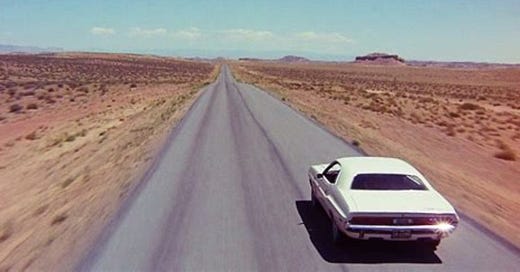Sunday, June 8th
8/30
From the meditations of The Pale Metaphysician
Speed creates a space of initiation, which may be lethal; its only rule is to leave no trace behind … it is a sort of slow-motion suicide, death by an extenuation of forms - the delectable form of their disappearance.1
This is a fragment from a longer paragraph where Baudrillard meditates on the nature of speed, of going real fast, in his work America, a travel journal of sorts as he journeyed across the States. It offers a unique outsider’s perspective of this strange country, but this notion, speed as a form of slow-motion suicide, has profoundly stuck with me throughout the years. Taking books as toolboxes, the notion is a useful tool.
Before I can continue, I should probably attempt to explain what the hell Baudrillard is talking about here. He’s referring to the act of driving across the deserts of the West, i.e., New Mexico, Utah, etc., specifically that exhilarating rush of super-becoming as you fly across the surface, but also to the metaphysical notion of “movement:” always to some point, hurrying up to stop, leaving whatever behind, outrunning. The ever-extending form of some thing approaching infinity before eventually, inevitably, vanishing without a trace — matter falling into a black hole undergoing spaghettification. Therein lies the suicide: by definition the faster one travels the sooner they’ll get where they’re going, an implicit self-annihilating teleology immanent to the act of movement itself sealing the fate of the mover. Indeed, as far as suicide methods go there are plenty quicker.
While this may initially seem contradictory and quite abstract, I believe the identity “speed = slow-motion suicide” is one everyone has felt at some point. What is burnout if not going too fast with no brakes? Even the physical act carries with it a nerve-wracking realization of annihilation (if you’ve never sped down the highway at 100+ mph, maybe you don’t know what I’m talking about2). However, the main reason I find the notion so useful is how it so perfectly describes the 21st century zeitgeist, summed up no more perfect than Mark Zuckerberg’s “move fast and break things.” The motto of any aspiring startup: to be bold. To be disruptive. To shirk regulations and lie to consumers! Many accept these tradeoffs by offering the argument that such speed offers a path to unparalleled progress and luxury, that any contemporary comfort wouldn’t be possible otherwise, pointing at, e.g., Europe’s over-regulation and slowness in adopting any kind of progress. Perhaps they’re correct. But if the fallout from this high velocity speaks for itself3 and with the recent ascension of AI into every-day vernacular it seems more and more that maybe the risk wasn’t adequately calculated.4
E. Trabitz has never sped down any highway nor condones the act in any way.
For example, the devastating consequences social media has had on self-image and connection.


